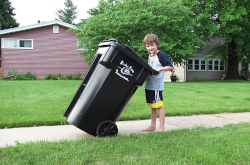낭비하다

Waste. It is something we are often told not to do. At home, parents tell us not to waste food. In the classroom, teachers tell us not to waste time. On a sports team, coaches tell us not to waste energy.
People who do not want to hear our ideas, tell us not to “waste our breath.”
Whether it is food, time, energy or breath -- waste is a loss of something valuable. Waste happens because we use too much of a resource or because we do not use it well.
We often use “waste” in arguments. If we are unhappy with someone, we can say: “Don’t waste my time.” If we are really unhappy with someone, we can say to them, “You are a waste of space!”
And if you are not happy with the result of something you have done, you can say, “Well, that was a complete waste of time.”
There are other ways we use the word “waste.”
If someone is very sick or is losing a lot of weight, we can say they are “wasting away.” And if someone has too much alcohol and cannot control their words and actions, we can say they are “wasted.”
So, those are some ways we use the word “waste.” We also find it in some useful expressions. Here’s the first one: “Haste makes waste.”
The online dictionary Merriam-Webster says this expression was first recorded in 1678. The full saying was: "Haste makes waste, and waste makes want, and want makes strife between the good-man and his wife."
“Haste” means doing something very quickly. “Haste makes waste” means if you hurry and rush while doing something, you could make mistakes. And it takes more time and effort to fix mistakes.
So, if someone says, “Hurry up! It’s taking you forever to cut that wood for the house project.” You can simply say: “Haste makes waste. I want to do it right the first time!”
The other common expression is: “Waste not, want not.”
This means that if a person never wastes things, he or she will have what is needed. We often say this as a response to being very frugal. Frugal people are careful about spending money or using things. They are not wasteful.
Here is one way to use it. Let’s say I am carefully putting paper into a pile. Some of the papers have writing on them, but most do not. And I think I can still use it for something.
If someone sees me and says, “Why don’t you just throw that paper away? We have lots of paper.” I can say to them, “Waste not, want not.” It is a simple way to say, “I don’t want to waste this paper. If I need it for something later, I’ll have it.”

